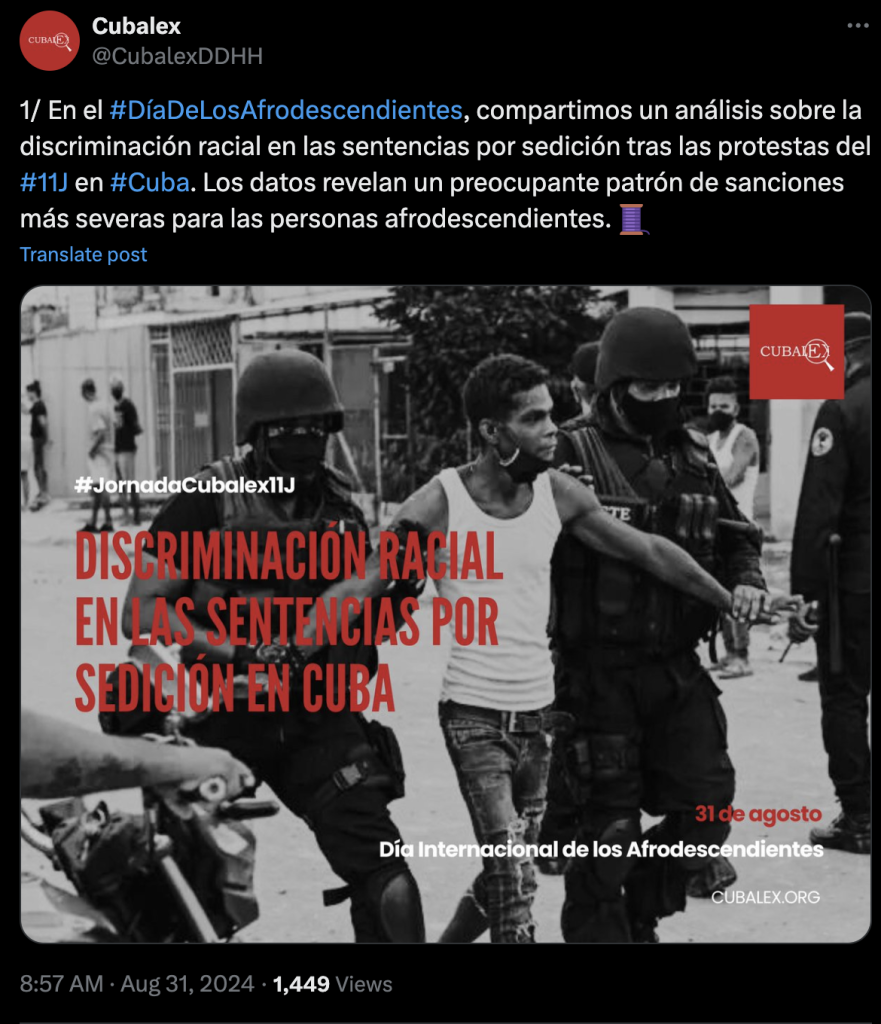Cubalex, 5 September 2024 — In this analysis, we examine the sedition sentences handed down in Cuba following the protests of 11 July 11, 2021. Our findings reveal a worrying racial bias that results in harsher sentences for people of African descent. This trend suggests the existence of systematic discrimination within the judicial system, disproportionately affecting one of the most vulnerable groups in Cuban society, who already face multiple forms of exclusion and inequality. Below, we present a detailed examination of these discriminatory patterns and their implications in the human rights context.
Below we present the key findings of this analysis.
Key Findings:
1. Duration of sanctions for “unfavourable conduct”:
People of African descent who are classified by the State as having “unfavourable conduct” receive sanctions with an average duration of 13.02 years, while non-Afro-descendants, under the same classification, receive sanctions with an average duration of 12.0 years.
Unfavourable conduct appears to have a greater impact on the length of sanctions for people of African descent, who receive longer sentences compared to non-African descendants who exhibit similar conduct. This finding suggests that the combination of being of African descent and having unfavourable conduct may exacerbate the negative impact on sentence length, which may indicate a racial bias in the legal treatment of people of African descent.
The analysis was carried out exclusively on the basis of photographs, which allowed us to include both black and other racialised people. This method was necessary due to the lack of official data disaggregated by race in Cuba, forcing us to use visual indicators to identify Afro-descendants and racialised people. While this approach has limitations, it is crucial to highlight racial disparities in a context where access to information is restricted and where the administration of justice is not transparent. This methodology highlights the need for broader access to official data to allow for a more comprehensive analysis of inequalities in Cuba.
2. General duration of sanctions:
According to the analysis of the first instance sentences to which Cubalex had access, Afro-descendants receive sentences with an average duration of 13.63 years, while non-Afro-descendants receive sentences with an average duration of 12.61 years.
These figures indicate that, regardless of conduct, people of African descent are subject to longer sentences compared to people of African descent. This suggests that the judicial system may be affected by racial biases that influence the severity of sentences.
People of African descent receive, on average, longer sentences than people of non-African descent. This difference could indicate a possible racial bias in sentencing, where race appears to influence the severity of sentences. This finding is significant and suggests the need for further analysis to understand the underlying causes of this discrepancy.
3. Impact of education on sanctions:
The duration of sanctions varies significantly according to the level of education among people of African descent:
– University: 11.0 years (1 person)
– Secondary: 13.05 years (59 persons)
-Primary school: 14.86 years (7 persons)
-Pre-university: 15.24 years (17 people)
-Skilled worker: 17.67 years (3 persons)
-Medium Technician: 22.5 years (2 persons)
This analysis suggests that people of African descent with lower levels of education tend to receive harsher penalties. This is not only evidence of the role of education in determining sentencing, but also of how socio-economic factors, combined with racial origin, can result in harsher treatment within the justice system.
The data show a consistent pattern of racial disparities in the length of judicial sanctions in Cuba. In particular, people of African descent, especially those categorised as having “unfavourable conduct” or lower levels of education, face longer sanctions than people of non-African descent. This racial bias in the administration of justice is a form of discrimination that perpetuates inequalities and social exclusion in Cuba.
4. What does the State mean by “unfavourable conduct”?
In order to understand the criteria that the state might consider as “unfavourable conduct”, an analysis can be made based on the available information on documented conduct and sanctions imposed. From the above analysis, some patterns can be identified that could be interpreted as indicators of what the state perceives as unfavourable conduct:
– Non-participation in community and political activities:
Pattern identified: Descriptions repeatedly mention the lack of participation in activities organised by social, political and mass organisations.
The state appears to value active participation in community and political activities as an indicator of conformity with social expectations. Lack of participation may be seen as a sign of lack of interest in or disagreement with the regime, which could be seen as unfavourable.
Disinclination to work
Pattern identified: It is observed that people who are unemployed or who are not studying, despite being physically and mentally able to do so, are perceived negatively
Having a job or being in the education system can be seen as a sign of social responsibility and usefulness. Disengagement from employment or education could be interpreted as unfavourable behaviour, as it suggests a lack of integration into the country’s productive system.
– Limited social rel




